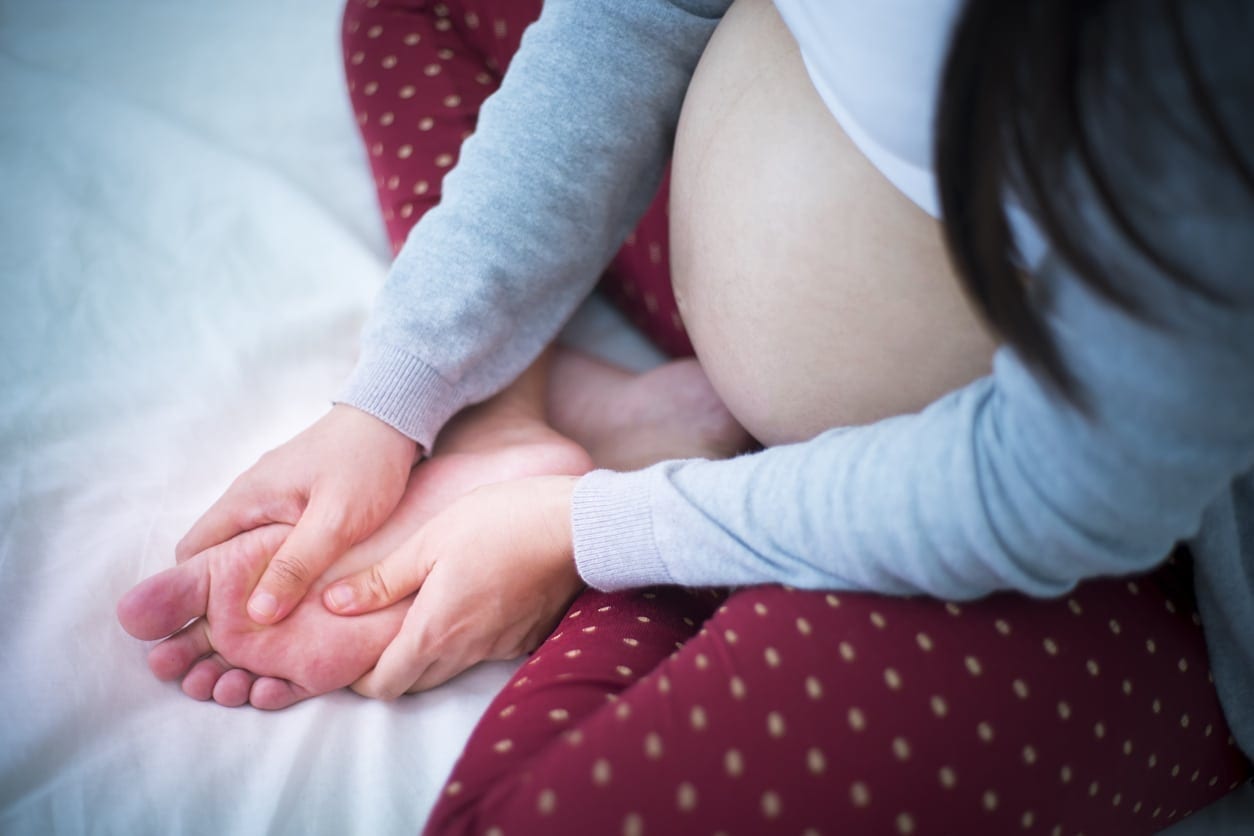Having swollen feet during pregnancy is a common discomfort when bringing new life into the world. This “puffy” feeling is normal during pregnancy, but several effective strategies help alleviate swelling and make you more comfortable. Let’s explore nine ways to reduce this pregnancy symptom.
What Causes Swollen Feet During Pregnancy?
If you notice your feet seem more swollen than usual and your shoes aren’t quite fitting while pregnant, you aren’t imagining things. Your body produces approximately 50% more blood and body fluids during pregnancy, which helps meet the demand for your growing uterus and developing baby.1
All of this growth puts pressure on your veins, which impairs the return of blood to the heart, causing swollen feet during pregnancy. Areas in the body, like the ankles, hands, and fingers, may also swell.2
Extra fluid retention is necessary to relax and soften the body to give it room to expand as the baby grows and develops. It also helps soften the pelvis, allowing the baby to pass through during delivery. Extra fluid, along with hormone fluctuations, can cause edema in pregnancy and make feet swell.1
Are Swollen Feet During Pregnancy Dangerous?
You may wonder when swelling during pregnancy should be a concern. A certain amount of swelling is okay, but if you notice sudden or severe swollen feet during pregnancy, such as pitting edema (when an indentation remains for a few seconds after pressing your thumb into your skin), or discoloration of your legs, contact your healthcare provider to rule out more severe issues like high blood pressure or preeclampsia.1,3
While swollen feet alone are usually not dangerous, call your doctor immediately if you notice swelling in one leg, pain, and tenderness, or skin that is red, warm to the touch, or discolored. Pregnant women are at an increased risk for blood clots (deep vein thrombosis), and any symptoms of one need to be checked out right away.4
How To Reduce Swollen Feet During Pregnancy
Consider these nine tips if you feel uncomfortable or want to prevent swollen feet while pregnant.
1. Stay Hydrated
Staying hydrated is one of the most effective ways to combat swelling. Drinking plenty of water helps flush excess sodium and fluids from your system, reducing swelling.5 Drink at least eight to 10 glasses of water daily.6 Consult with your healthcare provider for specific recommendations based on your personal needs.
2. Elevate Your Feet
Elevating your feet is a simple yet highly effective way to improve circulation and reduce swelling.7 If the skin of your legs and feet feels tight, prop them up on pillows or a comfortable chair. Your feet will thank you at the end of the day! Raising your feet above your heart allows gravity to help drain excess fluid from your legs and make you more comfortable.
3. Wear Compression Stockings
Compression socks for pregnancy provide gentle pressure to help improve blood circulation and reduce swelling. Wearing compression socks can alleviate discomfort and help prevent varicose veins in your legs. Compression socks were vital for helping me get through long nursing shifts, especially overnight. They come in various compression levels, so consult your healthcare provider to determine which type suits your needs.8
4. Exercise
Try to get in at least a few minutes of exercise a day. Low-impact exercises, like swimming, walking, and prenatal yoga, can improve circulation and reduce swelling.9,10 Prenatal yoga is also an excellent way to reduce stress, improve sleep, and increase your flexibility, strength, and endurance to prepare for labor.11 Make sure to consult your healthcare provider before starting any exercise routine.
Immersing yourself in water like a bathtub or pool or soaking your feet in warm water can help decrease edema.12 Use that as an excuse to take a nice leisurely bath!
5. Avoid Prolonged Sitting or Standing
If your job requires you to sit or stand for extended periods, try to take short breaks to walk around. Inactivity can contribute to swelling since fluid tends to pool in the lower extremities due to gravity and staying still.13 Pregnancy is tiring; all you may want to do is lay down and rest, but try to stay active to keep your blood flowing.
6. Limit Your Salt Intake
Excessive sodium intake can lead to water retention and worsen swelling.1 Prepackaged and processed food, canned food, and chips contain increased sodium.14 Choose fresh whole foods, and season your meals with herbs and spices instead of salt.
Foods that reduce swelling in feet and ankles may include bananas, sweet potatoes, kidney beans, and avocados. These foods increase potassium, which helps to reduce swelling by balancing electrolytes in your body.10
7. Massage
A gentle foot and leg massage can help stimulate blood flow and excrete fluid and impurities through the kidneys to reduce swelling.10 Try enlisting your partner to massage you, or you can use upward strokes to massage your feet and calves with a mild lotion. Splurge on a professional prenatal massage whenever you can to help relieve pregnancy discomfort and swelling.
8. Wear Comfortable Shoes
We all get to that point in pregnancy where we have difficulty putting on our shoes, and the thought of wearing them all day makes us wince in pain. Choosing comfortable, supportive shoes that provide adequate arch support with cushioning to help absorb shock impact can minimize fatigue and discomfort. Weight gain and posture changes in pregnancy can lead to overpronation, causing strain on your feet.15
Shoes with a wide toe box are one of the best shoes for pregnancy. They allow for good circulation, especially when your feet begin to swell. Avoid high heels, and go with low, stable-heel flats.16
9. Sleep on Your Left Side
Swelling tends to get worse toward the end of the day.17 Sleeping on your left side can help reduce swelling and lower blood pressure by taking the pressure off the inferior vena cava, which returns blood from the lower half of your body to your heart.18 This simple way of sleeping can also lower your risk of varicose veins and hemorrhoids and increase blood and nutrients to your placenta and baby.19
By implementing these nine strategies and home remedies for swollen feet during pregnancy, you can significantly reduce discomfort and alleviate the swelling in your feet. Remember to consult your healthcare provider before making significant changes to your routine during pregnancy.


























